Tesco PLC: Global Reward Management Strategies in Thailand
VerifiedAdded on 2023/01/11
|13
|3008
|92
Report
AI Summary
This report provides a comprehensive analysis of Tesco's global reward management strategies, focusing on its operations in Thailand and the United Kingdom. The report begins with an introduction to global reward management and its significance, followed by an examination of existing reward management policies in both the host country (Thailand) and the parent country (UK). It compares and contrasts these policies, highlighting key differences in compensation, reward distribution, and the use of monetary and non-monetary benefits. The report then identifies and evaluates future issues affecting reward strategies in Thailand, such as political instability, economic changes, competition, organizational costs, employee associations, cultural fit, and the shortage of skilled mid-level employees. For each issue, the report assesses its seriousness and provides recommendations for overcoming these challenges, offering valuable insights into how Tesco can adapt its reward strategies to ensure employee motivation and organizational success in a global context.

GLOBAL PERSPECTIVE IN
REWARDING PEOPLE
REWARDING PEOPLE
Secure Best Marks with AI Grader
Need help grading? Try our AI Grader for instant feedback on your assignments.
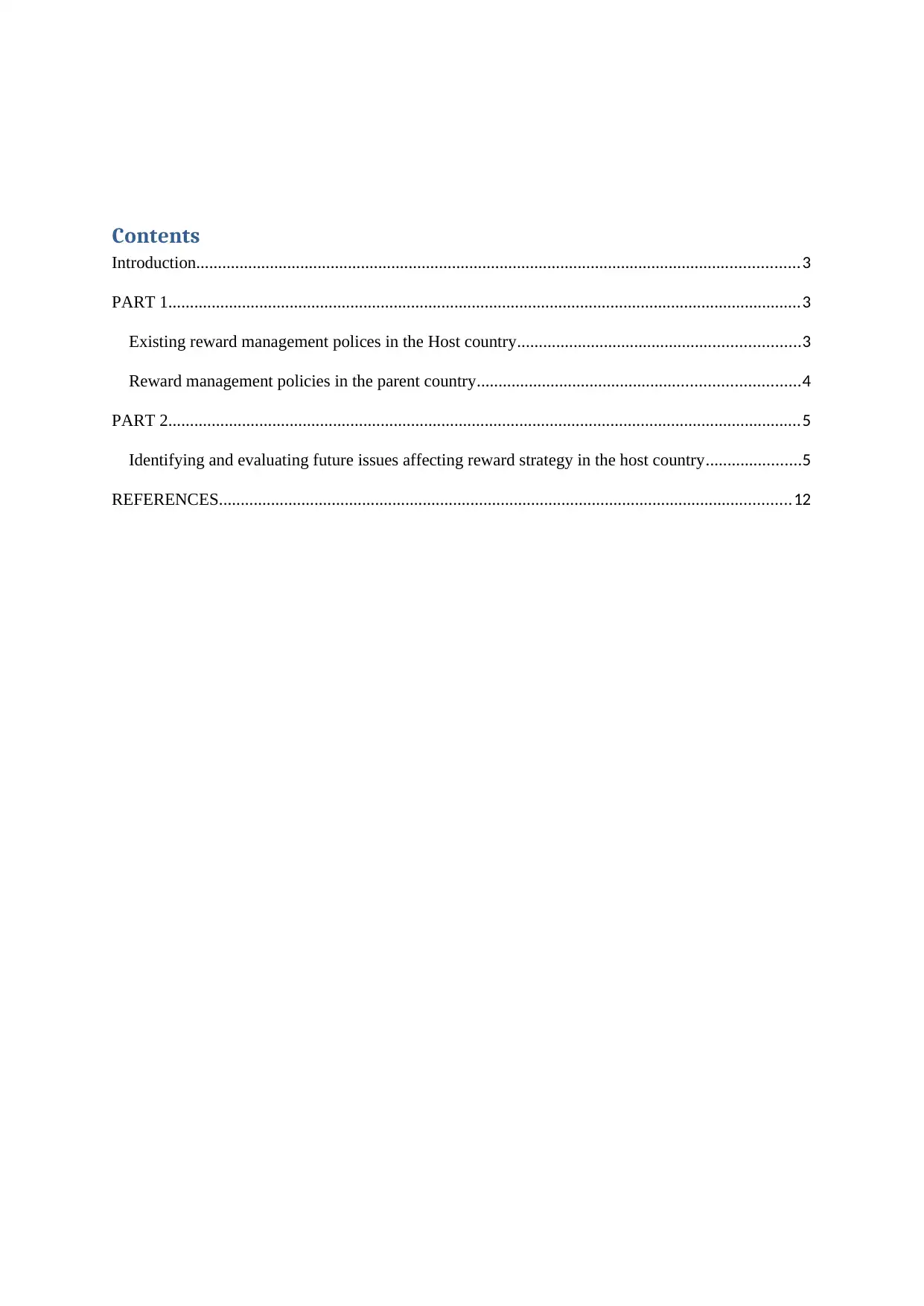
Contents
Introduction...........................................................................................................................................3
PART 1..................................................................................................................................................3
Existing reward management polices in the Host country.................................................................3
Reward management policies in the parent country..........................................................................4
PART 2..................................................................................................................................................5
Identifying and evaluating future issues affecting reward strategy in the host country......................5
REFERENCES....................................................................................................................................12
Introduction...........................................................................................................................................3
PART 1..................................................................................................................................................3
Existing reward management polices in the Host country.................................................................3
Reward management policies in the parent country..........................................................................4
PART 2..................................................................................................................................................5
Identifying and evaluating future issues affecting reward strategy in the host country......................5
REFERENCES....................................................................................................................................12
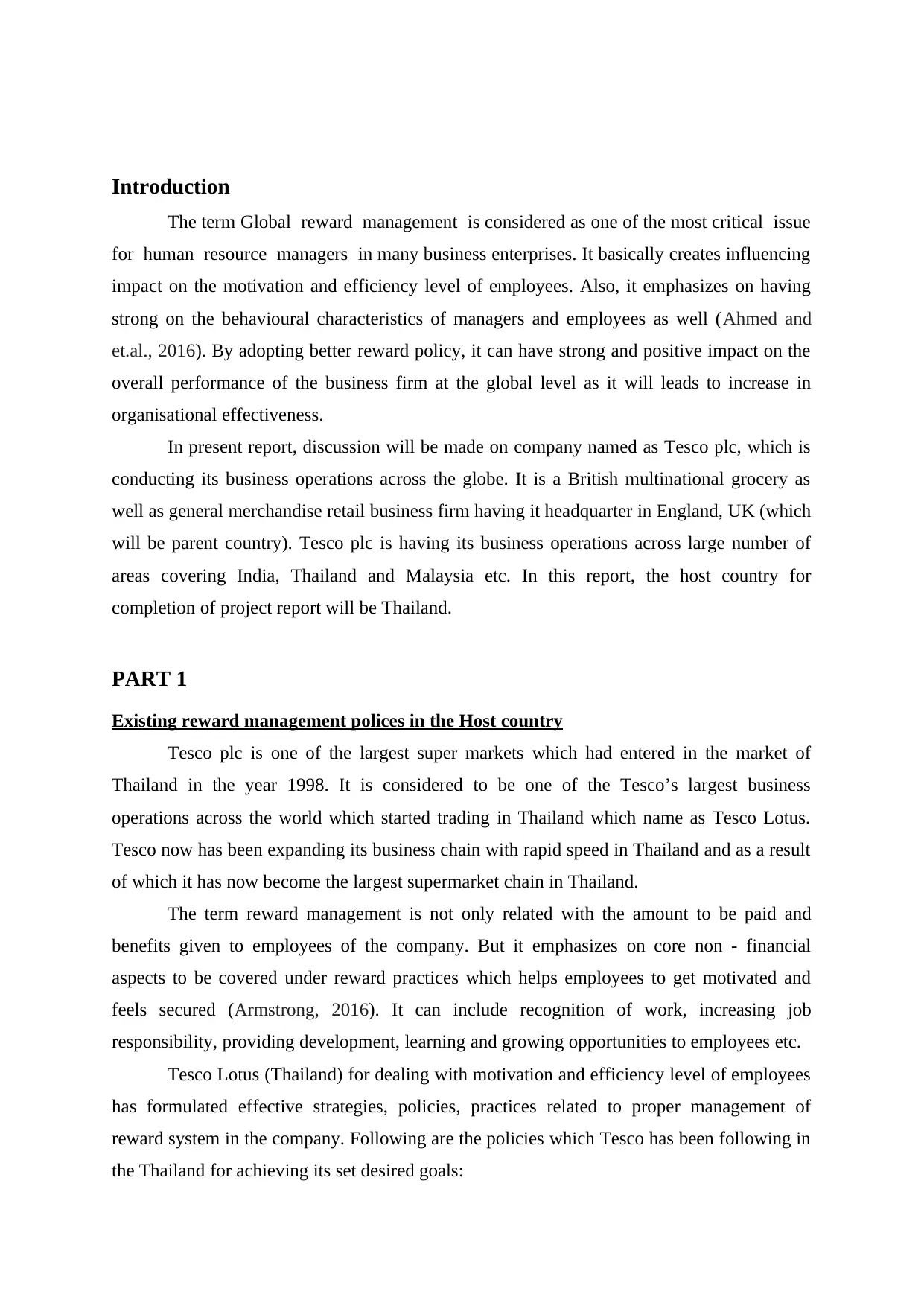
Introduction
The term Global reward management is considered as one of the most critical issue
for human resource managers in many business enterprises. It basically creates influencing
impact on the motivation and efficiency level of employees. Also, it emphasizes on having
strong on the behavioural characteristics of managers and employees as well (Ahmed and
et.al., 2016). By adopting better reward policy, it can have strong and positive impact on the
overall performance of the business firm at the global level as it will leads to increase in
organisational effectiveness.
In present report, discussion will be made on company named as Tesco plc, which is
conducting its business operations across the globe. It is a British multinational grocery as
well as general merchandise retail business firm having it headquarter in England, UK (which
will be parent country). Tesco plc is having its business operations across large number of
areas covering India, Thailand and Malaysia etc. In this report, the host country for
completion of project report will be Thailand.
PART 1
Existing reward management polices in the Host country
Tesco plc is one of the largest super markets which had entered in the market of
Thailand in the year 1998. It is considered to be one of the Tesco’s largest business
operations across the world which started trading in Thailand which name as Tesco Lotus.
Tesco now has been expanding its business chain with rapid speed in Thailand and as a result
of which it has now become the largest supermarket chain in Thailand.
The term reward management is not only related with the amount to be paid and
benefits given to employees of the company. But it emphasizes on core non - financial
aspects to be covered under reward practices which helps employees to get motivated and
feels secured (Armstrong, 2016). It can include recognition of work, increasing job
responsibility, providing development, learning and growing opportunities to employees etc.
Tesco Lotus (Thailand) for dealing with motivation and efficiency level of employees
has formulated effective strategies, policies, practices related to proper management of
reward system in the company. Following are the policies which Tesco has been following in
the Thailand for achieving its set desired goals:
The term Global reward management is considered as one of the most critical issue
for human resource managers in many business enterprises. It basically creates influencing
impact on the motivation and efficiency level of employees. Also, it emphasizes on having
strong on the behavioural characteristics of managers and employees as well (Ahmed and
et.al., 2016). By adopting better reward policy, it can have strong and positive impact on the
overall performance of the business firm at the global level as it will leads to increase in
organisational effectiveness.
In present report, discussion will be made on company named as Tesco plc, which is
conducting its business operations across the globe. It is a British multinational grocery as
well as general merchandise retail business firm having it headquarter in England, UK (which
will be parent country). Tesco plc is having its business operations across large number of
areas covering India, Thailand and Malaysia etc. In this report, the host country for
completion of project report will be Thailand.
PART 1
Existing reward management polices in the Host country
Tesco plc is one of the largest super markets which had entered in the market of
Thailand in the year 1998. It is considered to be one of the Tesco’s largest business
operations across the world which started trading in Thailand which name as Tesco Lotus.
Tesco now has been expanding its business chain with rapid speed in Thailand and as a result
of which it has now become the largest supermarket chain in Thailand.
The term reward management is not only related with the amount to be paid and
benefits given to employees of the company. But it emphasizes on core non - financial
aspects to be covered under reward practices which helps employees to get motivated and
feels secured (Armstrong, 2016). It can include recognition of work, increasing job
responsibility, providing development, learning and growing opportunities to employees etc.
Tesco Lotus (Thailand) for dealing with motivation and efficiency level of employees
has formulated effective strategies, policies, practices related to proper management of
reward system in the company. Following are the policies which Tesco has been following in
the Thailand for achieving its set desired goals:
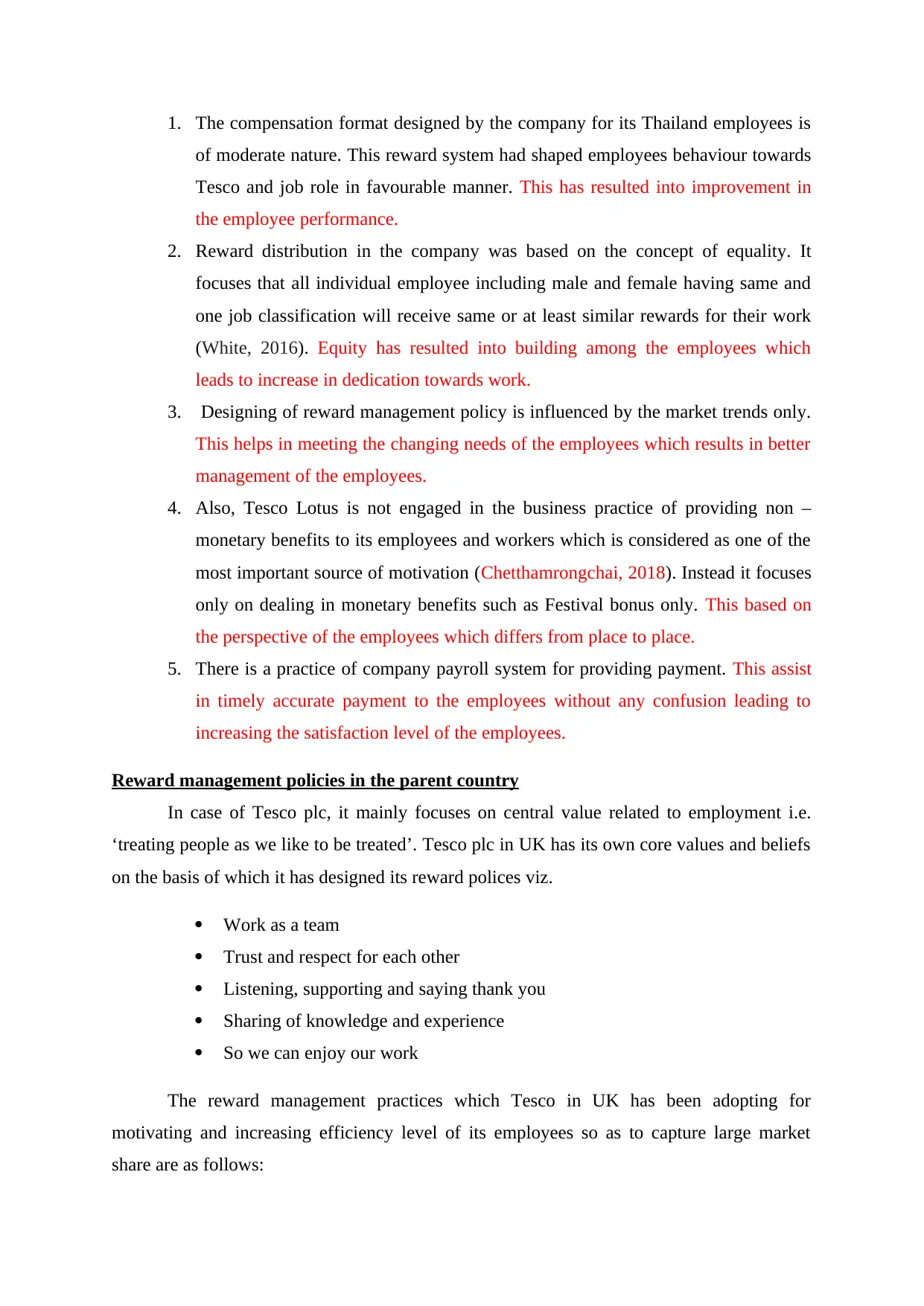
1. The compensation format designed by the company for its Thailand employees is
of moderate nature. This reward system had shaped employees behaviour towards
Tesco and job role in favourable manner. This has resulted into improvement in
the employee performance.
2. Reward distribution in the company was based on the concept of equality. It
focuses that all individual employee including male and female having same and
one job classification will receive same or at least similar rewards for their work
(White, 2016). Equity has resulted into building among the employees which
leads to increase in dedication towards work.
3. Designing of reward management policy is influenced by the market trends only.
This helps in meeting the changing needs of the employees which results in better
management of the employees.
4. Also, Tesco Lotus is not engaged in the business practice of providing non –
monetary benefits to its employees and workers which is considered as one of the
most important source of motivation (Chetthamrongchai, 2018). Instead it focuses
only on dealing in monetary benefits such as Festival bonus only. This based on
the perspective of the employees which differs from place to place.
5. There is a practice of company payroll system for providing payment. This assist
in timely accurate payment to the employees without any confusion leading to
increasing the satisfaction level of the employees.
Reward management policies in the parent country
In case of Tesco plc, it mainly focuses on central value related to employment i.e.
‘treating people as we like to be treated’. Tesco plc in UK has its own core values and beliefs
on the basis of which it has designed its reward polices viz.
Work as a team
Trust and respect for each other
Listening, supporting and saying thank you
Sharing of knowledge and experience
So we can enjoy our work
The reward management practices which Tesco in UK has been adopting for
motivating and increasing efficiency level of its employees so as to capture large market
share are as follows:
of moderate nature. This reward system had shaped employees behaviour towards
Tesco and job role in favourable manner. This has resulted into improvement in
the employee performance.
2. Reward distribution in the company was based on the concept of equality. It
focuses that all individual employee including male and female having same and
one job classification will receive same or at least similar rewards for their work
(White, 2016). Equity has resulted into building among the employees which
leads to increase in dedication towards work.
3. Designing of reward management policy is influenced by the market trends only.
This helps in meeting the changing needs of the employees which results in better
management of the employees.
4. Also, Tesco Lotus is not engaged in the business practice of providing non –
monetary benefits to its employees and workers which is considered as one of the
most important source of motivation (Chetthamrongchai, 2018). Instead it focuses
only on dealing in monetary benefits such as Festival bonus only. This based on
the perspective of the employees which differs from place to place.
5. There is a practice of company payroll system for providing payment. This assist
in timely accurate payment to the employees without any confusion leading to
increasing the satisfaction level of the employees.
Reward management policies in the parent country
In case of Tesco plc, it mainly focuses on central value related to employment i.e.
‘treating people as we like to be treated’. Tesco plc in UK has its own core values and beliefs
on the basis of which it has designed its reward polices viz.
Work as a team
Trust and respect for each other
Listening, supporting and saying thank you
Sharing of knowledge and experience
So we can enjoy our work
The reward management practices which Tesco in UK has been adopting for
motivating and increasing efficiency level of its employees so as to capture large market
share are as follows:
Secure Best Marks with AI Grader
Need help grading? Try our AI Grader for instant feedback on your assignments.
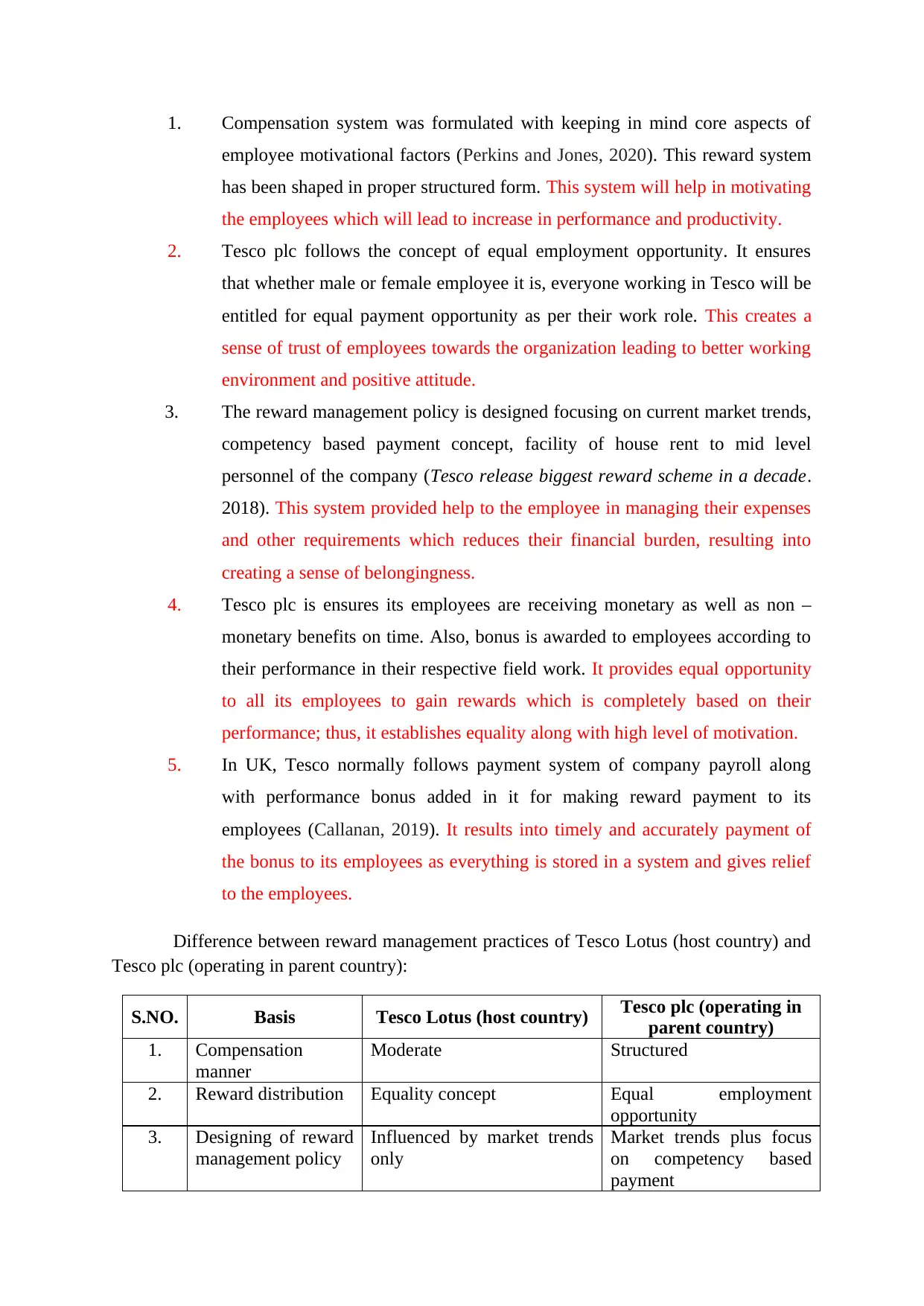
1. Compensation system was formulated with keeping in mind core aspects of
employee motivational factors (Perkins and Jones, 2020). This reward system
has been shaped in proper structured form. This system will help in motivating
the employees which will lead to increase in performance and productivity.
2. Tesco plc follows the concept of equal employment opportunity. It ensures
that whether male or female employee it is, everyone working in Tesco will be
entitled for equal payment opportunity as per their work role. This creates a
sense of trust of employees towards the organization leading to better working
environment and positive attitude.
3. The reward management policy is designed focusing on current market trends,
competency based payment concept, facility of house rent to mid level
personnel of the company (Tesco release biggest reward scheme in a decade.
2018). This system provided help to the employee in managing their expenses
and other requirements which reduces their financial burden, resulting into
creating a sense of belongingness.
4. Tesco plc is ensures its employees are receiving monetary as well as non –
monetary benefits on time. Also, bonus is awarded to employees according to
their performance in their respective field work. It provides equal opportunity
to all its employees to gain rewards which is completely based on their
performance; thus, it establishes equality along with high level of motivation.
5. In UK, Tesco normally follows payment system of company payroll along
with performance bonus added in it for making reward payment to its
employees (Callanan, 2019). It results into timely and accurately payment of
the bonus to its employees as everything is stored in a system and gives relief
to the employees.
Difference between reward management practices of Tesco Lotus (host country) and
Tesco plc (operating in parent country):
S.NO. Basis Tesco Lotus (host country) Tesco plc (operating in
parent country)
1. Compensation
manner
Moderate Structured
2. Reward distribution Equality concept Equal employment
opportunity
3. Designing of reward
management policy
Influenced by market trends
only
Market trends plus focus
on competency based
payment
employee motivational factors (Perkins and Jones, 2020). This reward system
has been shaped in proper structured form. This system will help in motivating
the employees which will lead to increase in performance and productivity.
2. Tesco plc follows the concept of equal employment opportunity. It ensures
that whether male or female employee it is, everyone working in Tesco will be
entitled for equal payment opportunity as per their work role. This creates a
sense of trust of employees towards the organization leading to better working
environment and positive attitude.
3. The reward management policy is designed focusing on current market trends,
competency based payment concept, facility of house rent to mid level
personnel of the company (Tesco release biggest reward scheme in a decade.
2018). This system provided help to the employee in managing their expenses
and other requirements which reduces their financial burden, resulting into
creating a sense of belongingness.
4. Tesco plc is ensures its employees are receiving monetary as well as non –
monetary benefits on time. Also, bonus is awarded to employees according to
their performance in their respective field work. It provides equal opportunity
to all its employees to gain rewards which is completely based on their
performance; thus, it establishes equality along with high level of motivation.
5. In UK, Tesco normally follows payment system of company payroll along
with performance bonus added in it for making reward payment to its
employees (Callanan, 2019). It results into timely and accurately payment of
the bonus to its employees as everything is stored in a system and gives relief
to the employees.
Difference between reward management practices of Tesco Lotus (host country) and
Tesco plc (operating in parent country):
S.NO. Basis Tesco Lotus (host country) Tesco plc (operating in
parent country)
1. Compensation
manner
Moderate Structured
2. Reward distribution Equality concept Equal employment
opportunity
3. Designing of reward
management policy
Influenced by market trends
only
Market trends plus focus
on competency based
payment
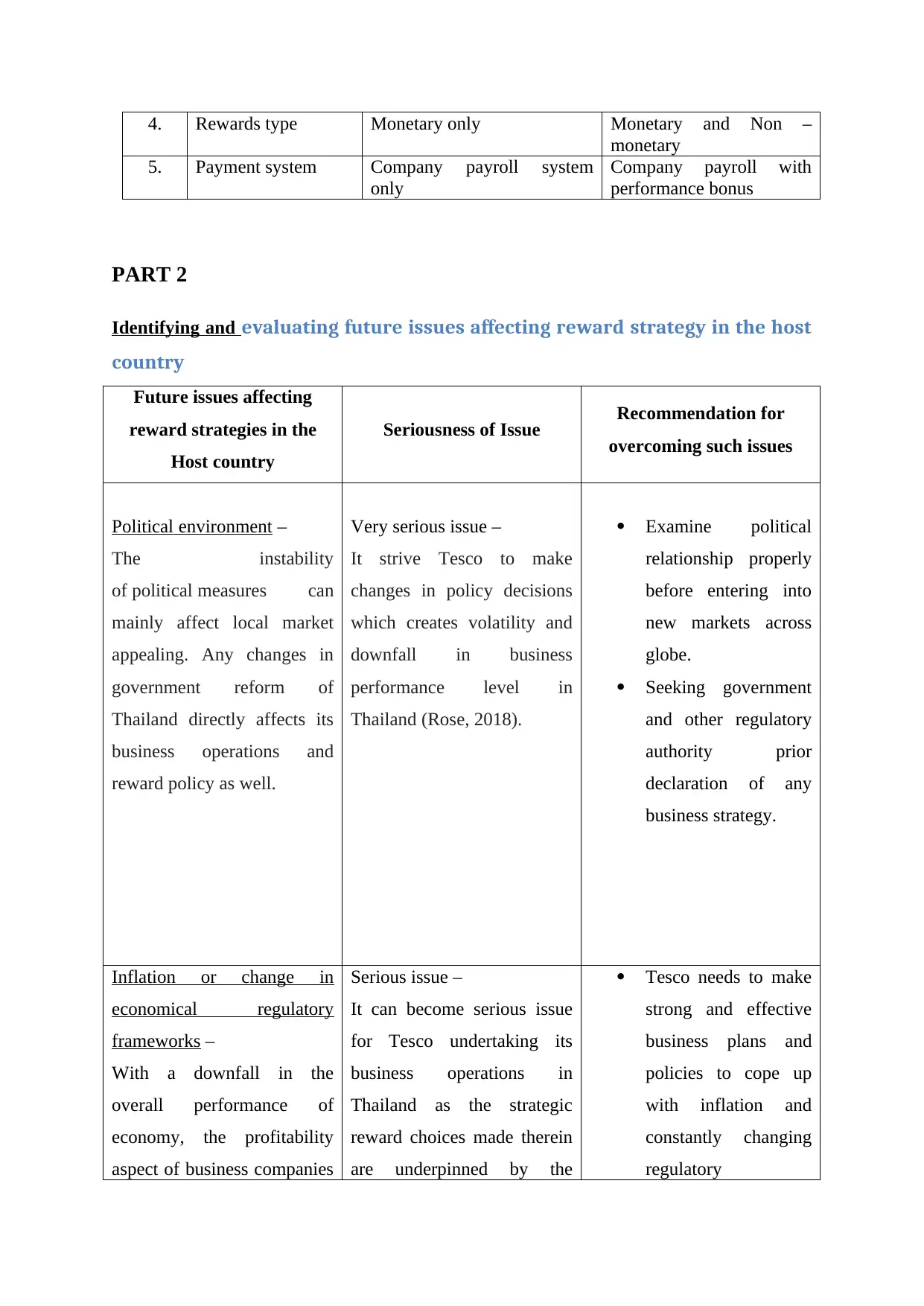
4. Rewards type Monetary only Monetary and Non –
monetary
5. Payment system Company payroll system
only
Company payroll with
performance bonus
PART 2
Identifying and evaluating future issues affecting reward strategy in the host
country
Future issues affecting
reward strategies in the
Host country
Seriousness of Issue Recommendation for
overcoming such issues
Political environment –
The instability
of political measures can
mainly affect local market
appealing. Any changes in
government reform of
Thailand directly affects its
business operations and
reward policy as well.
Very serious issue –
It strive Tesco to make
changes in policy decisions
which creates volatility and
downfall in business
performance level in
Thailand (Rose, 2018).
Examine political
relationship properly
before entering into
new markets across
globe.
Seeking government
and other regulatory
authority prior
declaration of any
business strategy.
Inflation or change in
economical regulatory
frameworks –
With a downfall in the
overall performance of
economy, the profitability
aspect of business companies
Serious issue –
It can become serious issue
for Tesco undertaking its
business operations in
Thailand as the strategic
reward choices made therein
are underpinned by the
Tesco needs to make
strong and effective
business plans and
policies to cope up
with inflation and
constantly changing
regulatory
monetary
5. Payment system Company payroll system
only
Company payroll with
performance bonus
PART 2
Identifying and evaluating future issues affecting reward strategy in the host
country
Future issues affecting
reward strategies in the
Host country
Seriousness of Issue Recommendation for
overcoming such issues
Political environment –
The instability
of political measures can
mainly affect local market
appealing. Any changes in
government reform of
Thailand directly affects its
business operations and
reward policy as well.
Very serious issue –
It strive Tesco to make
changes in policy decisions
which creates volatility and
downfall in business
performance level in
Thailand (Rose, 2018).
Examine political
relationship properly
before entering into
new markets across
globe.
Seeking government
and other regulatory
authority prior
declaration of any
business strategy.
Inflation or change in
economical regulatory
frameworks –
With a downfall in the
overall performance of
economy, the profitability
aspect of business companies
Serious issue –
It can become serious issue
for Tesco undertaking its
business operations in
Thailand as the strategic
reward choices made therein
are underpinned by the
Tesco needs to make
strong and effective
business plans and
policies to cope up
with inflation and
constantly changing
regulatory
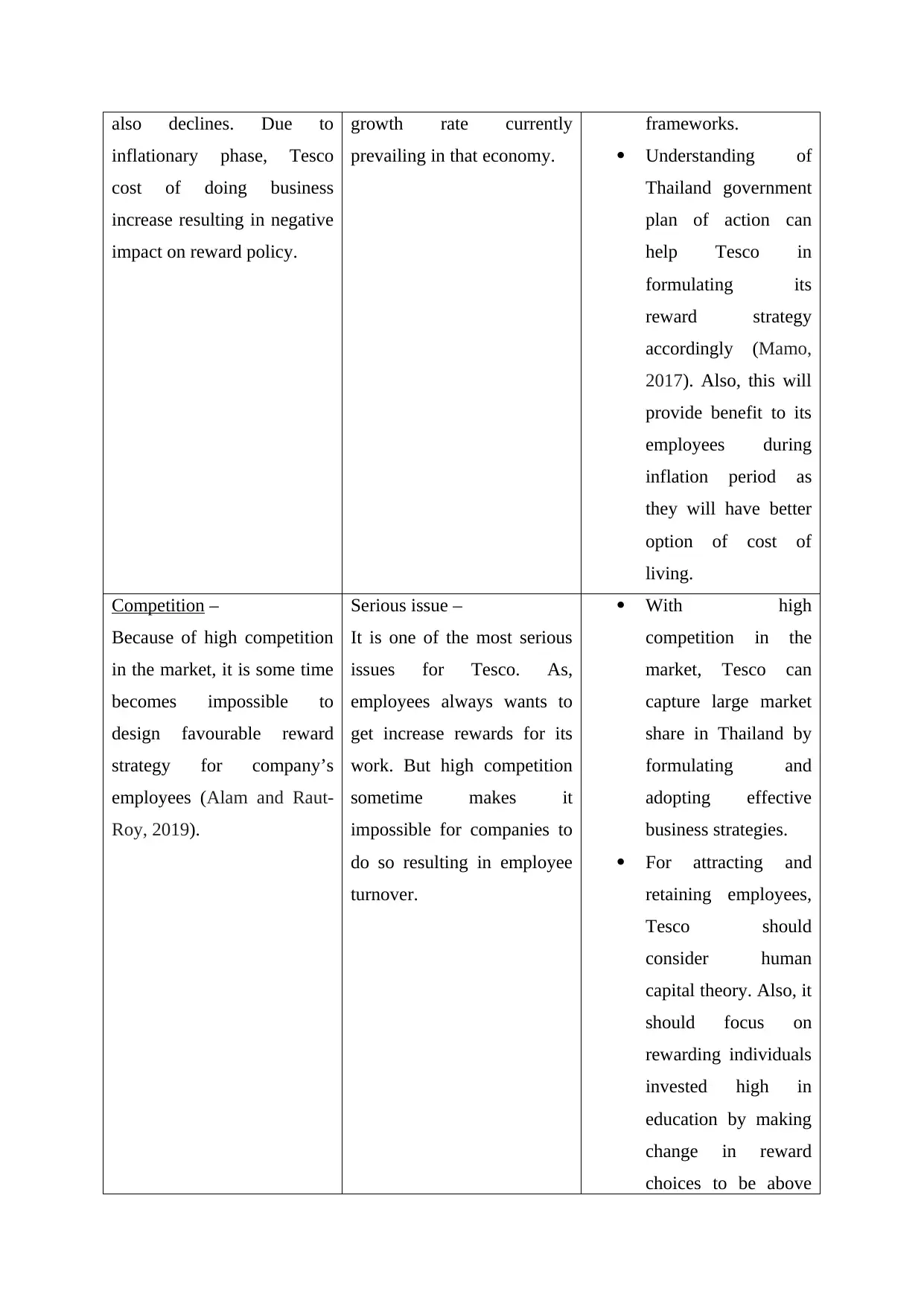
also declines. Due to
inflationary phase, Tesco
cost of doing business
increase resulting in negative
impact on reward policy.
growth rate currently
prevailing in that economy.
frameworks.
Understanding of
Thailand government
plan of action can
help Tesco in
formulating its
reward strategy
accordingly (Mamo,
2017). Also, this will
provide benefit to its
employees during
inflation period as
they will have better
option of cost of
living.
Competition –
Because of high competition
in the market, it is some time
becomes impossible to
design favourable reward
strategy for company’s
employees (Alam and Raut-
Roy, 2019).
Serious issue –
It is one of the most serious
issues for Tesco. As,
employees always wants to
get increase rewards for its
work. But high competition
sometime makes it
impossible for companies to
do so resulting in employee
turnover.
With high
competition in the
market, Tesco can
capture large market
share in Thailand by
formulating and
adopting effective
business strategies.
For attracting and
retaining employees,
Tesco should
consider human
capital theory. Also, it
should focus on
rewarding individuals
invested high in
education by making
change in reward
choices to be above
inflationary phase, Tesco
cost of doing business
increase resulting in negative
impact on reward policy.
growth rate currently
prevailing in that economy.
frameworks.
Understanding of
Thailand government
plan of action can
help Tesco in
formulating its
reward strategy
accordingly (Mamo,
2017). Also, this will
provide benefit to its
employees during
inflation period as
they will have better
option of cost of
living.
Competition –
Because of high competition
in the market, it is some time
becomes impossible to
design favourable reward
strategy for company’s
employees (Alam and Raut-
Roy, 2019).
Serious issue –
It is one of the most serious
issues for Tesco. As,
employees always wants to
get increase rewards for its
work. But high competition
sometime makes it
impossible for companies to
do so resulting in employee
turnover.
With high
competition in the
market, Tesco can
capture large market
share in Thailand by
formulating and
adopting effective
business strategies.
For attracting and
retaining employees,
Tesco should
consider human
capital theory. Also, it
should focus on
rewarding individuals
invested high in
education by making
change in reward
choices to be above
Paraphrase This Document
Need a fresh take? Get an instant paraphrase of this document with our AI Paraphraser
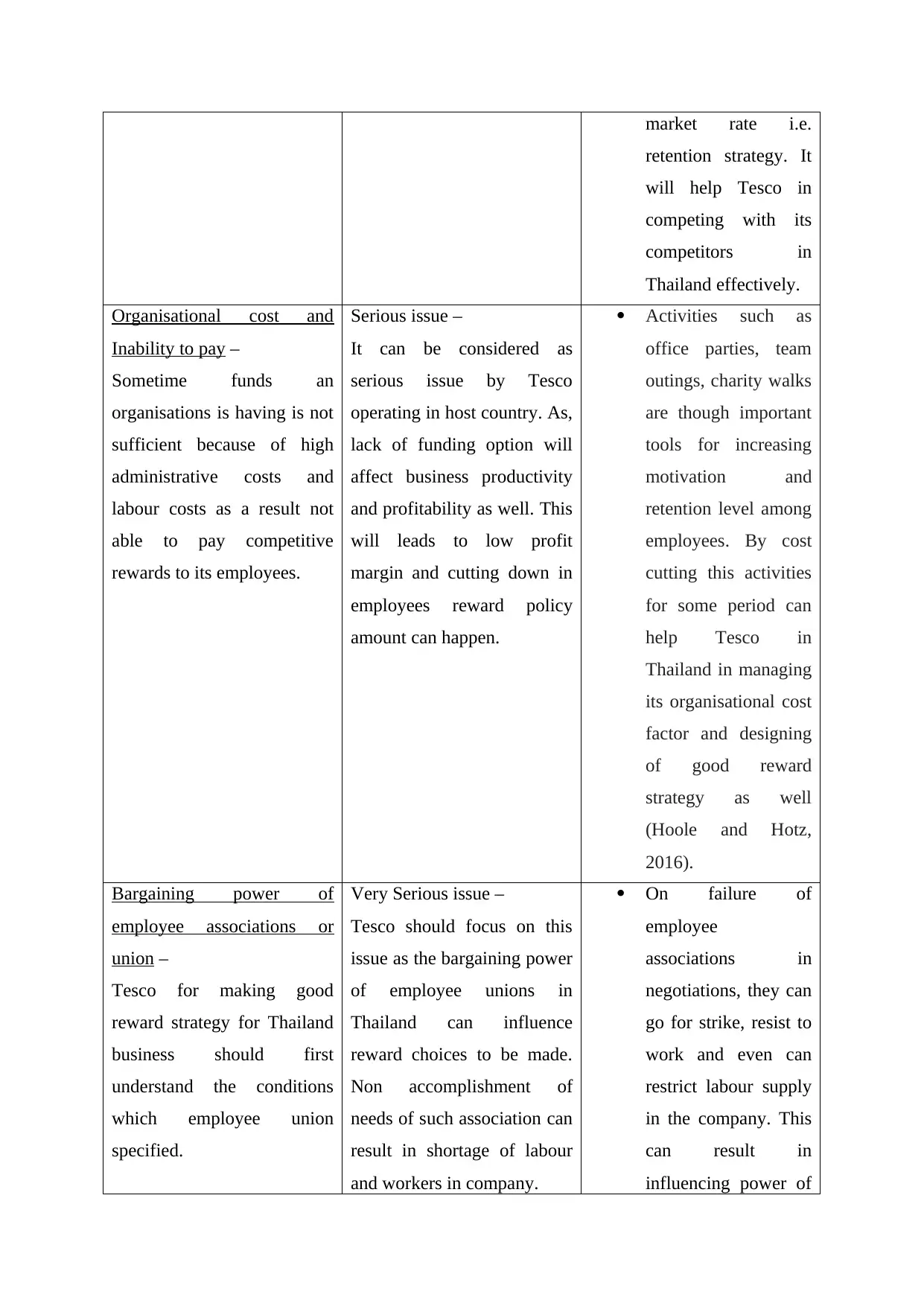
market rate i.e.
retention strategy. It
will help Tesco in
competing with its
competitors in
Thailand effectively.
Organisational cost and
Inability to pay –
Sometime funds an
organisations is having is not
sufficient because of high
administrative costs and
labour costs as a result not
able to pay competitive
rewards to its employees.
Serious issue –
It can be considered as
serious issue by Tesco
operating in host country. As,
lack of funding option will
affect business productivity
and profitability as well. This
will leads to low profit
margin and cutting down in
employees reward policy
amount can happen.
Activities such as
office parties, team
outings, charity walks
are though important
tools for increasing
motivation and
retention level among
employees. By cost
cutting this activities
for some period can
help Tesco in
Thailand in managing
its organisational cost
factor and designing
of good reward
strategy as well
(Hoole and Hotz,
2016).
Bargaining power of
employee associations or
union –
Tesco for making good
reward strategy for Thailand
business should first
understand the conditions
which employee union
specified.
Very Serious issue –
Tesco should focus on this
issue as the bargaining power
of employee unions in
Thailand can influence
reward choices to be made.
Non accomplishment of
needs of such association can
result in shortage of labour
and workers in company.
On failure of
employee
associations in
negotiations, they can
go for strike, resist to
work and even can
restrict labour supply
in the company. This
can result in
influencing power of
retention strategy. It
will help Tesco in
competing with its
competitors in
Thailand effectively.
Organisational cost and
Inability to pay –
Sometime funds an
organisations is having is not
sufficient because of high
administrative costs and
labour costs as a result not
able to pay competitive
rewards to its employees.
Serious issue –
It can be considered as
serious issue by Tesco
operating in host country. As,
lack of funding option will
affect business productivity
and profitability as well. This
will leads to low profit
margin and cutting down in
employees reward policy
amount can happen.
Activities such as
office parties, team
outings, charity walks
are though important
tools for increasing
motivation and
retention level among
employees. By cost
cutting this activities
for some period can
help Tesco in
Thailand in managing
its organisational cost
factor and designing
of good reward
strategy as well
(Hoole and Hotz,
2016).
Bargaining power of
employee associations or
union –
Tesco for making good
reward strategy for Thailand
business should first
understand the conditions
which employee union
specified.
Very Serious issue –
Tesco should focus on this
issue as the bargaining power
of employee unions in
Thailand can influence
reward choices to be made.
Non accomplishment of
needs of such association can
result in shortage of labour
and workers in company.
On failure of
employee
associations in
negotiations, they can
go for strike, resist to
work and even can
restrict labour supply
in the company. This
can result in
influencing power of
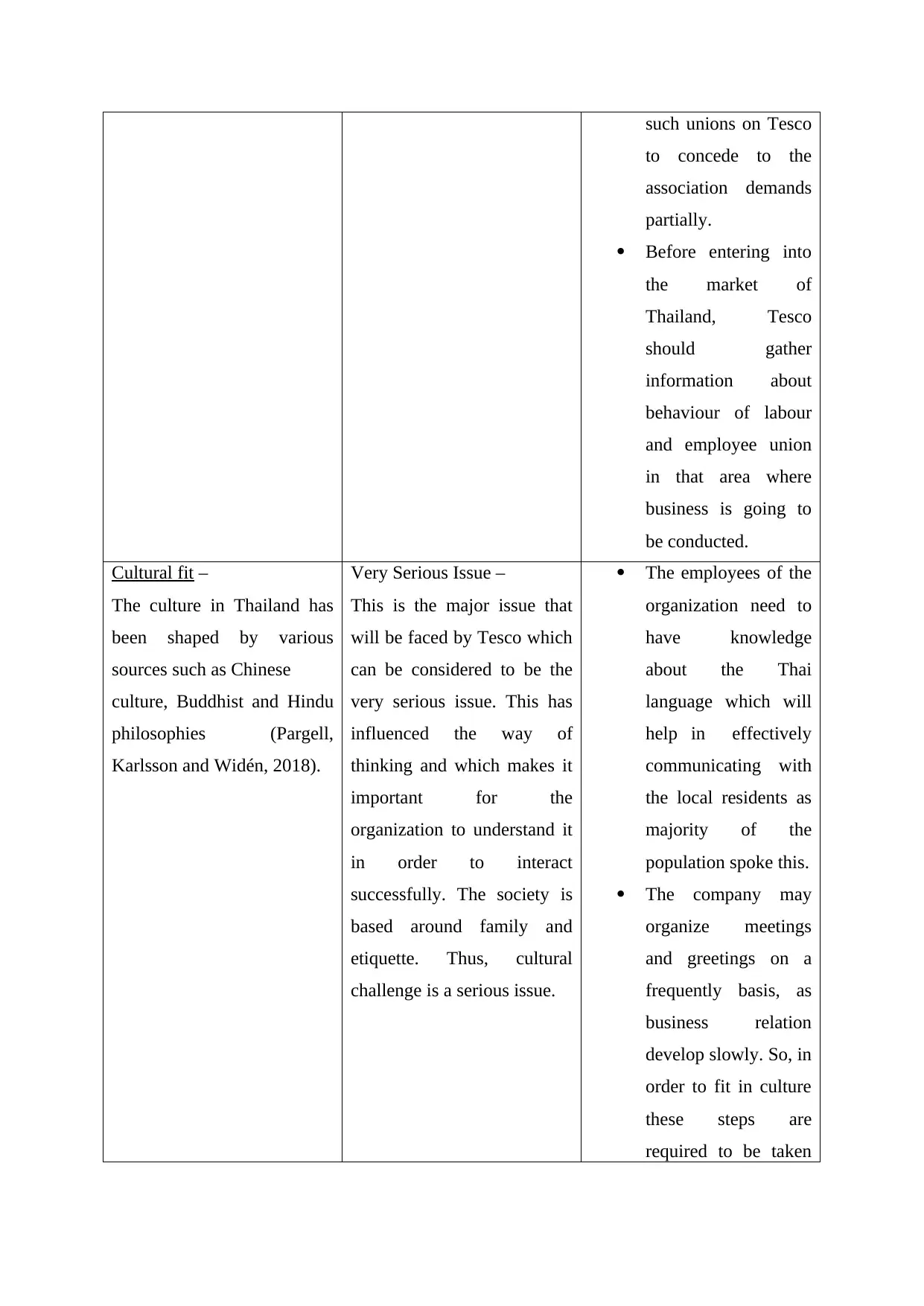
such unions on Tesco
to concede to the
association demands
partially.
Before entering into
the market of
Thailand, Tesco
should gather
information about
behaviour of labour
and employee union
in that area where
business is going to
be conducted.
Cultural fit –
The culture in Thailand has
been shaped by various
sources such as Chinese
culture, Buddhist and Hindu
philosophies (Pargell,
Karlsson and Widén, 2018).
Very Serious Issue –
This is the major issue that
will be faced by Tesco which
can be considered to be the
very serious issue. This has
influenced the way of
thinking and which makes it
important for the
organization to understand it
in order to interact
successfully. The society is
based around family and
etiquette. Thus, cultural
challenge is a serious issue.
The employees of the
organization need to
have knowledge
about the Thai
language which will
help in effectively
communicating with
the local residents as
majority of the
population spoke this.
The company may
organize meetings
and greetings on a
frequently basis, as
business relation
develop slowly. So, in
order to fit in culture
these steps are
required to be taken
to concede to the
association demands
partially.
Before entering into
the market of
Thailand, Tesco
should gather
information about
behaviour of labour
and employee union
in that area where
business is going to
be conducted.
Cultural fit –
The culture in Thailand has
been shaped by various
sources such as Chinese
culture, Buddhist and Hindu
philosophies (Pargell,
Karlsson and Widén, 2018).
Very Serious Issue –
This is the major issue that
will be faced by Tesco which
can be considered to be the
very serious issue. This has
influenced the way of
thinking and which makes it
important for the
organization to understand it
in order to interact
successfully. The society is
based around family and
etiquette. Thus, cultural
challenge is a serious issue.
The employees of the
organization need to
have knowledge
about the Thai
language which will
help in effectively
communicating with
the local residents as
majority of the
population spoke this.
The company may
organize meetings
and greetings on a
frequently basis, as
business relation
develop slowly. So, in
order to fit in culture
these steps are
required to be taken
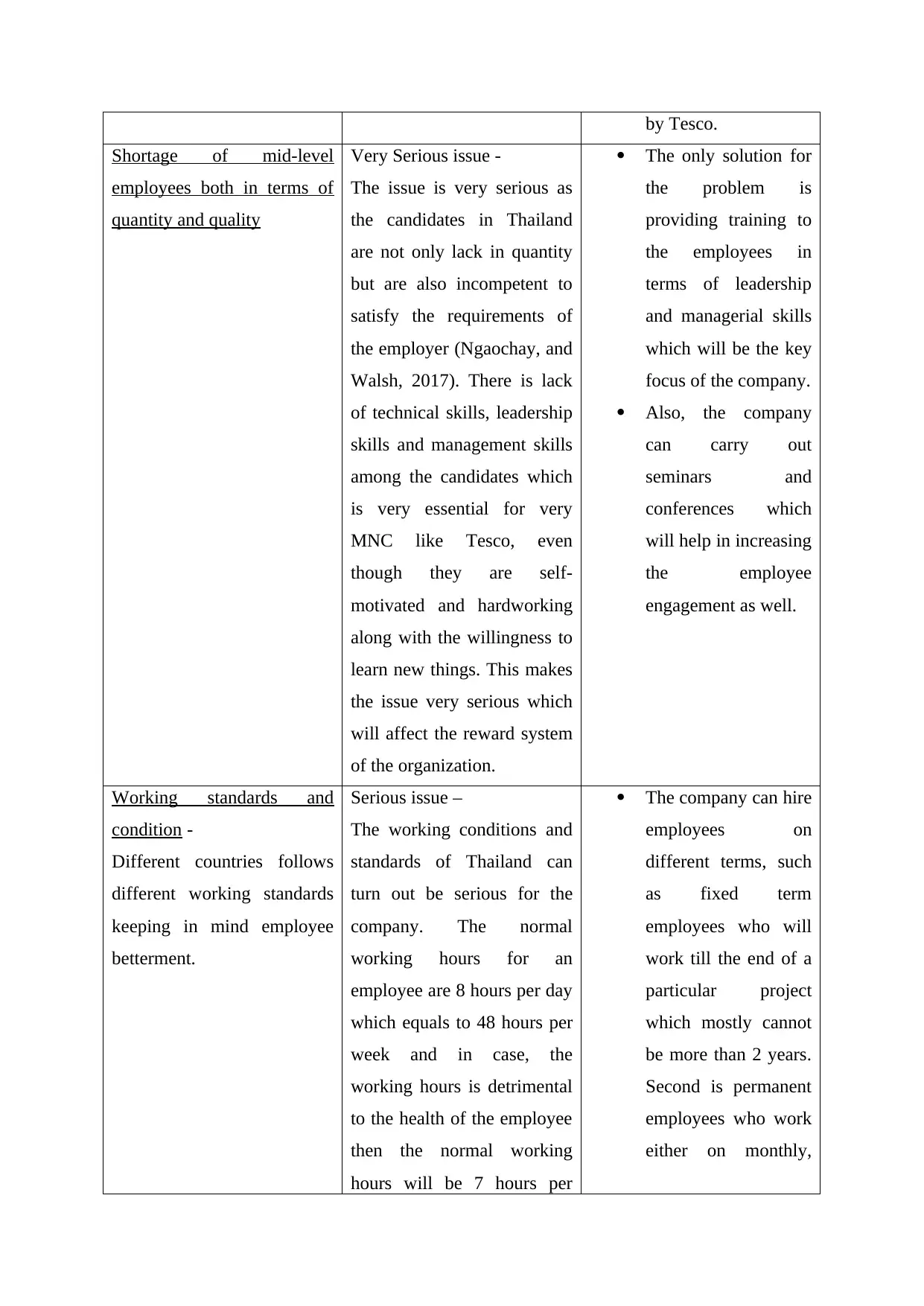
by Tesco.
Shortage of mid-level
employees both in terms of
quantity and quality
Very Serious issue -
The issue is very serious as
the candidates in Thailand
are not only lack in quantity
but are also incompetent to
satisfy the requirements of
the employer (Ngaochay, and
Walsh, 2017). There is lack
of technical skills, leadership
skills and management skills
among the candidates which
is very essential for very
MNC like Tesco, even
though they are self-
motivated and hardworking
along with the willingness to
learn new things. This makes
the issue very serious which
will affect the reward system
of the organization.
The only solution for
the problem is
providing training to
the employees in
terms of leadership
and managerial skills
which will be the key
focus of the company.
Also, the company
can carry out
seminars and
conferences which
will help in increasing
the employee
engagement as well.
Working standards and
condition -
Different countries follows
different working standards
keeping in mind employee
betterment.
Serious issue –
The working conditions and
standards of Thailand can
turn out be serious for the
company. The normal
working hours for an
employee are 8 hours per day
which equals to 48 hours per
week and in case, the
working hours is detrimental
to the health of the employee
then the normal working
hours will be 7 hours per
The company can hire
employees on
different terms, such
as fixed term
employees who will
work till the end of a
particular project
which mostly cannot
be more than 2 years.
Second is permanent
employees who work
either on monthly,
Shortage of mid-level
employees both in terms of
quantity and quality
Very Serious issue -
The issue is very serious as
the candidates in Thailand
are not only lack in quantity
but are also incompetent to
satisfy the requirements of
the employer (Ngaochay, and
Walsh, 2017). There is lack
of technical skills, leadership
skills and management skills
among the candidates which
is very essential for very
MNC like Tesco, even
though they are self-
motivated and hardworking
along with the willingness to
learn new things. This makes
the issue very serious which
will affect the reward system
of the organization.
The only solution for
the problem is
providing training to
the employees in
terms of leadership
and managerial skills
which will be the key
focus of the company.
Also, the company
can carry out
seminars and
conferences which
will help in increasing
the employee
engagement as well.
Working standards and
condition -
Different countries follows
different working standards
keeping in mind employee
betterment.
Serious issue –
The working conditions and
standards of Thailand can
turn out be serious for the
company. The normal
working hours for an
employee are 8 hours per day
which equals to 48 hours per
week and in case, the
working hours is detrimental
to the health of the employee
then the normal working
hours will be 7 hours per
The company can hire
employees on
different terms, such
as fixed term
employees who will
work till the end of a
particular project
which mostly cannot
be more than 2 years.
Second is permanent
employees who work
either on monthly,
Secure Best Marks with AI Grader
Need help grading? Try our AI Grader for instant feedback on your assignments.
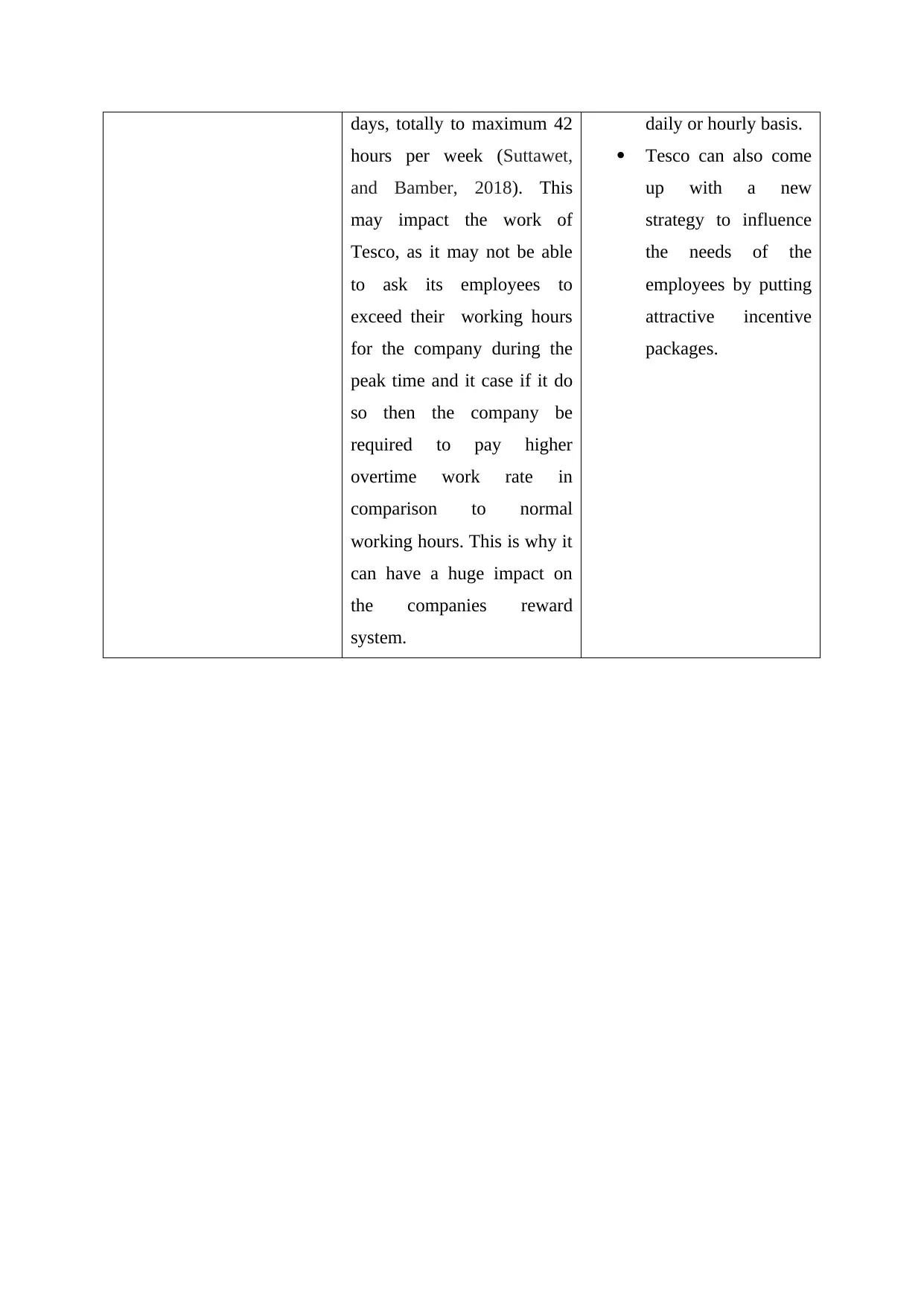
days, totally to maximum 42
hours per week (Suttawet,
and Bamber, 2018). This
may impact the work of
Tesco, as it may not be able
to ask its employees to
exceed their working hours
for the company during the
peak time and it case if it do
so then the company be
required to pay higher
overtime work rate in
comparison to normal
working hours. This is why it
can have a huge impact on
the companies reward
system.
daily or hourly basis.
Tesco can also come
up with a new
strategy to influence
the needs of the
employees by putting
attractive incentive
packages.
hours per week (Suttawet,
and Bamber, 2018). This
may impact the work of
Tesco, as it may not be able
to ask its employees to
exceed their working hours
for the company during the
peak time and it case if it do
so then the company be
required to pay higher
overtime work rate in
comparison to normal
working hours. This is why it
can have a huge impact on
the companies reward
system.
daily or hourly basis.
Tesco can also come
up with a new
strategy to influence
the needs of the
employees by putting
attractive incentive
packages.
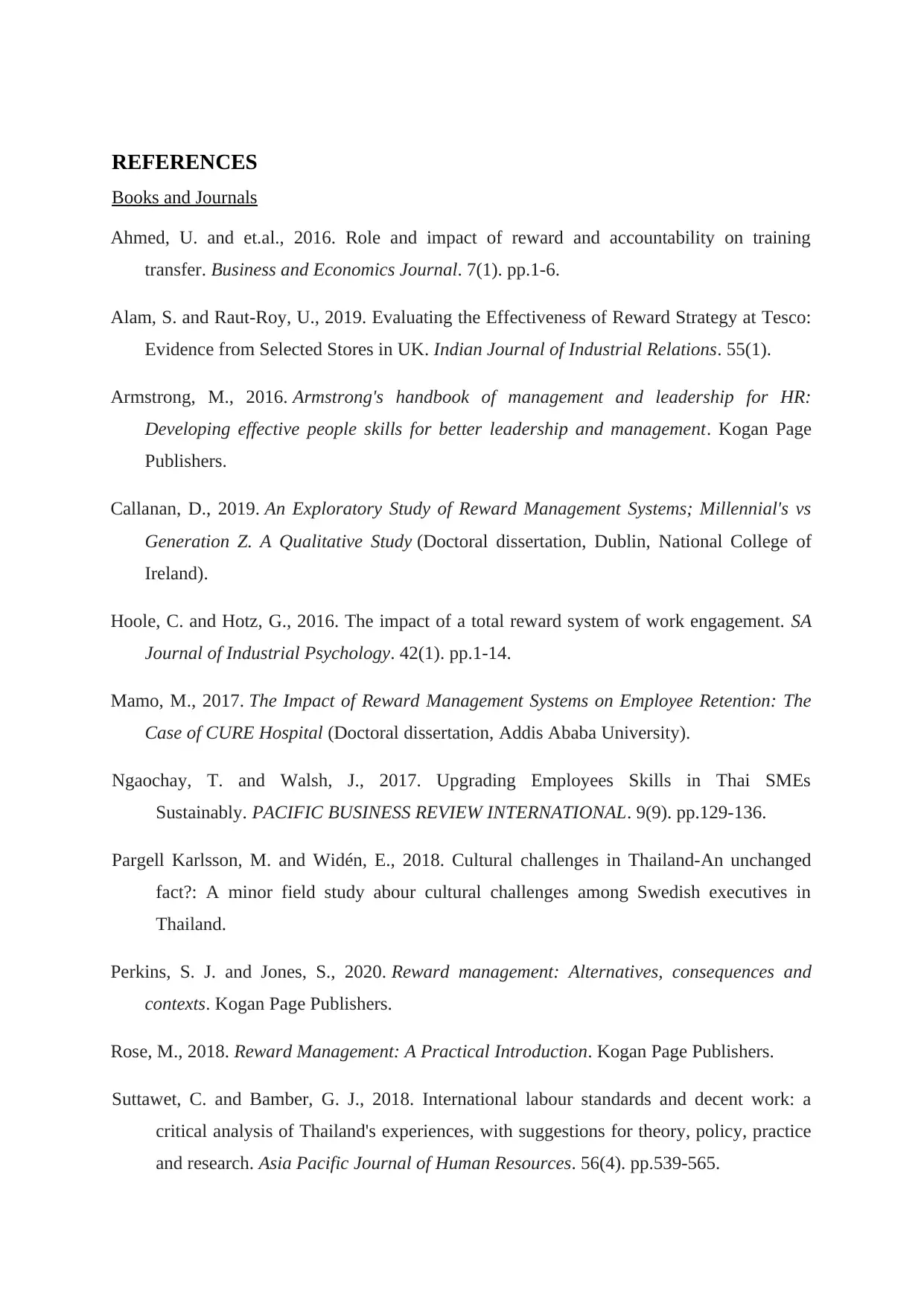
REFERENCES
Books and Journals
Ahmed, U. and et.al., 2016. Role and impact of reward and accountability on training
transfer. Business and Economics Journal. 7(1). pp.1-6.
Alam, S. and Raut-Roy, U., 2019. Evaluating the Effectiveness of Reward Strategy at Tesco:
Evidence from Selected Stores in UK. Indian Journal of Industrial Relations. 55(1).
Armstrong, M., 2016. Armstrong's handbook of management and leadership for HR:
Developing effective people skills for better leadership and management. Kogan Page
Publishers.
Callanan, D., 2019. An Exploratory Study of Reward Management Systems; Millennial's vs
Generation Z. A Qualitative Study (Doctoral dissertation, Dublin, National College of
Ireland).
Hoole, C. and Hotz, G., 2016. The impact of a total reward system of work engagement. SA
Journal of Industrial Psychology. 42(1). pp.1-14.
Mamo, M., 2017. The Impact of Reward Management Systems on Employee Retention: The
Case of CURE Hospital (Doctoral dissertation, Addis Ababa University).
Ngaochay, T. and Walsh, J., 2017. Upgrading Employees Skills in Thai SMEs
Sustainably. PACIFIC BUSINESS REVIEW INTERNATIONAL. 9(9). pp.129-136.
Pargell Karlsson, M. and Widén, E., 2018. Cultural challenges in Thailand-An unchanged
fact?: A minor field study abour cultural challenges among Swedish executives in
Thailand.
Perkins, S. J. and Jones, S., 2020. Reward management: Alternatives, consequences and
contexts. Kogan Page Publishers.
Rose, M., 2018. Reward Management: A Practical Introduction. Kogan Page Publishers.
Suttawet, C. and Bamber, G. J., 2018. International labour standards and decent work: a
critical analysis of Thailand's experiences, with suggestions for theory, policy, practice
and research. Asia Pacific Journal of Human Resources. 56(4). pp.539-565.
Books and Journals
Ahmed, U. and et.al., 2016. Role and impact of reward and accountability on training
transfer. Business and Economics Journal. 7(1). pp.1-6.
Alam, S. and Raut-Roy, U., 2019. Evaluating the Effectiveness of Reward Strategy at Tesco:
Evidence from Selected Stores in UK. Indian Journal of Industrial Relations. 55(1).
Armstrong, M., 2016. Armstrong's handbook of management and leadership for HR:
Developing effective people skills for better leadership and management. Kogan Page
Publishers.
Callanan, D., 2019. An Exploratory Study of Reward Management Systems; Millennial's vs
Generation Z. A Qualitative Study (Doctoral dissertation, Dublin, National College of
Ireland).
Hoole, C. and Hotz, G., 2016. The impact of a total reward system of work engagement. SA
Journal of Industrial Psychology. 42(1). pp.1-14.
Mamo, M., 2017. The Impact of Reward Management Systems on Employee Retention: The
Case of CURE Hospital (Doctoral dissertation, Addis Ababa University).
Ngaochay, T. and Walsh, J., 2017. Upgrading Employees Skills in Thai SMEs
Sustainably. PACIFIC BUSINESS REVIEW INTERNATIONAL. 9(9). pp.129-136.
Pargell Karlsson, M. and Widén, E., 2018. Cultural challenges in Thailand-An unchanged
fact?: A minor field study abour cultural challenges among Swedish executives in
Thailand.
Perkins, S. J. and Jones, S., 2020. Reward management: Alternatives, consequences and
contexts. Kogan Page Publishers.
Rose, M., 2018. Reward Management: A Practical Introduction. Kogan Page Publishers.
Suttawet, C. and Bamber, G. J., 2018. International labour standards and decent work: a
critical analysis of Thailand's experiences, with suggestions for theory, policy, practice
and research. Asia Pacific Journal of Human Resources. 56(4). pp.539-565.
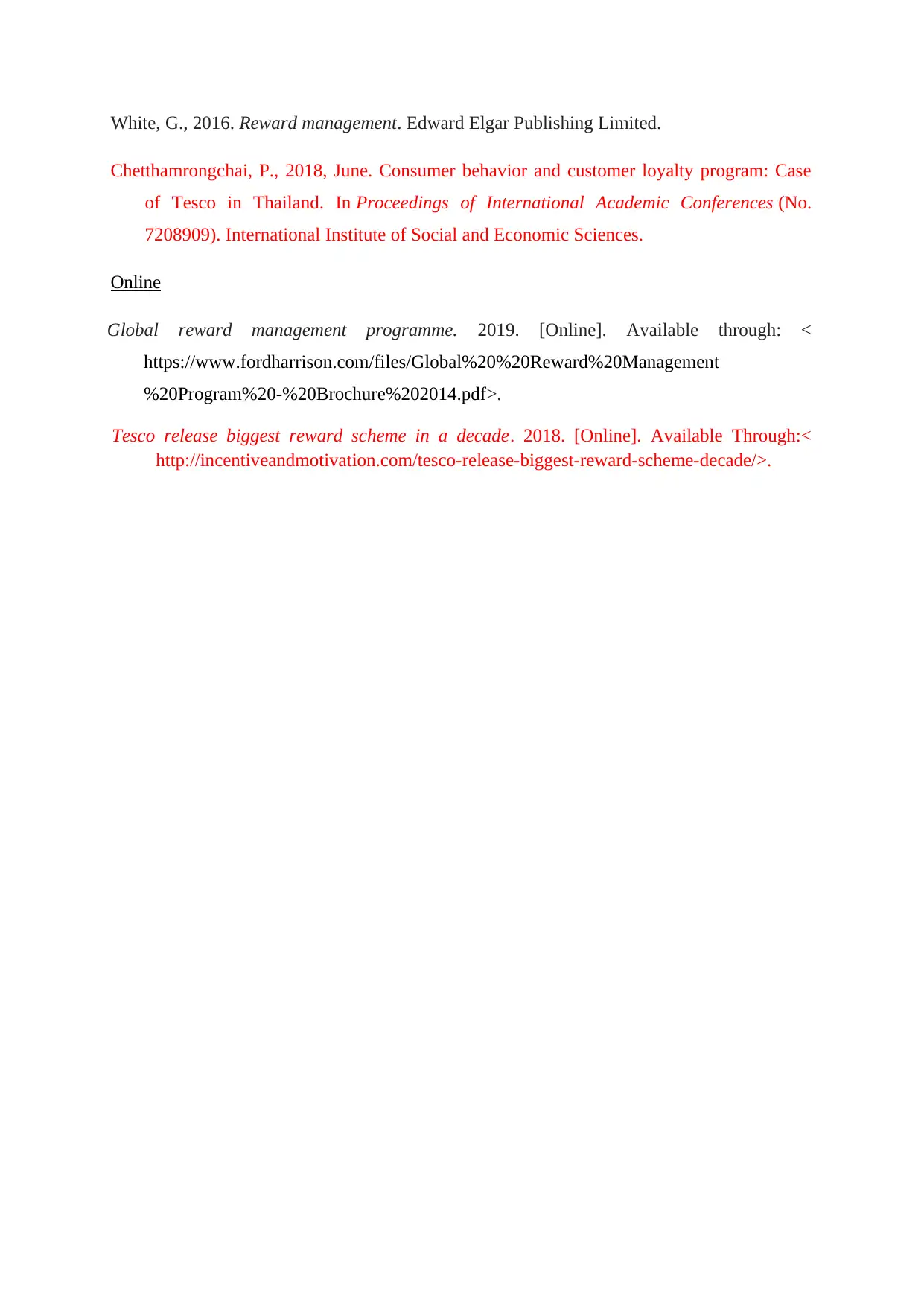
White, G., 2016. Reward management. Edward Elgar Publishing Limited.
Chetthamrongchai, P., 2018, June. Consumer behavior and customer loyalty program: Case
of Tesco in Thailand. In Proceedings of International Academic Conferences (No.
7208909). International Institute of Social and Economic Sciences.
Online
Global reward management programme. 2019. [Online]. Available through: <
https://www.fordharrison.com/files/Global%20%20Reward%20Management
%20Program%20-%20Brochure%202014.pdf>.
Tesco release biggest reward scheme in a decade. 2018. [Online]. Available Through:<
http://incentiveandmotivation.com/tesco-release-biggest-reward-scheme-decade/>.
Chetthamrongchai, P., 2018, June. Consumer behavior and customer loyalty program: Case
of Tesco in Thailand. In Proceedings of International Academic Conferences (No.
7208909). International Institute of Social and Economic Sciences.
Online
Global reward management programme. 2019. [Online]. Available through: <
https://www.fordharrison.com/files/Global%20%20Reward%20Management
%20Program%20-%20Brochure%202014.pdf>.
Tesco release biggest reward scheme in a decade. 2018. [Online]. Available Through:<
http://incentiveandmotivation.com/tesco-release-biggest-reward-scheme-decade/>.
1 out of 13
Related Documents
Your All-in-One AI-Powered Toolkit for Academic Success.
+13062052269
info@desklib.com
Available 24*7 on WhatsApp / Email
![[object Object]](/_next/static/media/star-bottom.7253800d.svg)
Unlock your academic potential
© 2024 | Zucol Services PVT LTD | All rights reserved.




